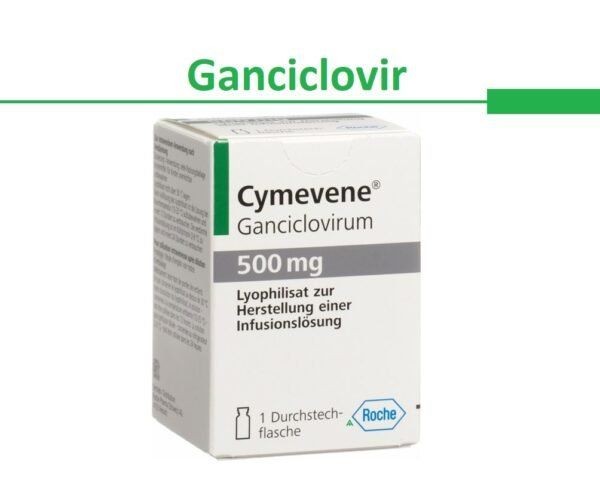
ganciclovir – injection, Cytovene
WARNING: Ganciclovir can decrease bone marrow function. This serious, possibly life-threatening side effect may lead to a low number of blood cells such as red cells, white cells, and platelets. This effect can cause anemia, decrease your body’s ability to fight an infection, and cause bleeding problems. Your doctor will check the results of your blood tests and adjust your treatment to reduce your risk for these side effects. Seek immediate medical attention if you develop signs of anemia (such as unusual tiredness, fast breathing, pale skin, fast heartbeat), signs of infection (such as fever, chills, cough, persistent sore throat), and signs of bleeding (such as easy bruising/bleeding, nose bleeds, bleeding gums, bloody/black/tarry stools, vomit that looks like coffee grounds). Ganciclovir has caused decreased sperm production in animals and may decrease the ability of men to father a baby. Ganciclovir has caused tumors in laboratory animals. Although there is no information in humans, ganciclovir should be considered cancer-causing (carcinogenic). See also How to Use and Precautions sections. USES: Ganciclovir is an anti-viral drug. It is used to prevent disease caused by a virus called cytomegalovirus (CMV) in people who have received organ or bone marrow transplants. CMV disease can lead to serious infections in the body, including an infection in the eye, called CMV retinitis, that can cause blindness. Ganciclovir is also used to treat people with weakened immune systems (including people with AIDS) who have CMV retinitis. Ganciclovir works by slowing the growth of the CMV virus. It helps control CMV retinitis and decrease the risk of blindness. It also helps prevent the spread of infection to other areas of the body. Ganciclovir is not a cure for CMV disease. Some people may have worsening CMV retinitis even with treatment. Therefore, it is important to have your eyes checked regularly by your doctor. OTHER: This section contains uses of this drug that are not listed in the approved professional labeling for the drug but that may be prescribed by your health care professional. Use this drug for a condition that is listed in this section only if it has been so prescribed by your health care professional. This drug may also be used to help prevent CMV disease in patients receiving cancer chemotherapy treatment. HOW TO USE: This medication is given by injection into a vein usually over a 1-hour period. Do not give this medication any faster than prescribed because doing so will increase the risk of side effects. At the start of treatment, ganciclovir is usually given every 12 hours for the first few weeks, and then once a day either 5 to 7 times a week after that, or as directed by your doctor. Drink plenty of fluids while using this medication unless your doctor directs you otherwise. This medication will be prepared by a special pharmacy. If you are using this medication at home, learn all usage instructions from your health care professional. If you have any questions about using this medication properly, consult your health care professional. Before using, check this product visually for particles or discoloration. If either is present, do not use the liquid. Wear gloves when you handle this medication. Avoid direct contact with the liquid. Avoid getting it on your skin or in your mucous membranes, including your mouth, nose, and eyes. If contact should occur, wash the area thoroughly with soap and water. If this medication gets in your eyes, rinse them thoroughly with plain water. Learn how to store and discard needles and medical supplies safely. Special disposal is required for this medication and all injection supplies used with it. Consult your pharmacist for more information. The dosage and length of treatment is based on your weight, medical condition, and response to treatment. This medication works best when the amount of drug in your body is kept at a constant level. Therefore, use this drug at evenly spaced intervals. To help you remember, use it at the same time(s) each day. Continue using this medication exactly as prescribed by your doctor. Do not skip any doses or stop using this medication even for a short time unless directed to do so by your doctor. Skipping or stopping treatment without approval from your doctor may make the infection worse. Keep all medical and laboratory appointments. Tell your doctor if your condition worsens (such as worsening vision).
QUESTION
SIDE EFFECTS: See also Warning section. Diarrhea, upset stomach, dizziness, drowsiness, unsteadiness, shaking (tremors), or pain/redness/irritation at the injection site may occur. If any of these effects persist or worsen, tell your doctor or pharmacist promptly. Many people using this medication do not have serious side effects. Tell your doctor immediately if any of these unlikely but serious side effects occur: mental/mood changes (such as confusion, hallucinations), change in the amount of urine, seizures. A very serious allergic reaction to this drug is rare. However, seek immediate medical attention if you notice any symptoms of a serious allergic reaction, including: rash, itching/swelling (especially of the face/tongue/throat), severe dizziness, trouble breathing. This is not a complete list of possible side effects. If you notice other effects not listed above, contact your doctor or pharmacist. In the US – Call your doctor for medical advice about side effects. You may report side effects to FDA at 1-800-FDA-1088. In Canada – Call your doctor for medical advice about side effects. You may report side effects to Health Canada at 1-866-234-2345.
PRECAUTIONS: Before using ganciclovir, tell your doctor or pharmacist if you are allergic to it; or to valganciclovir or acyclovir; or if you have any other allergies. This product may contain inactive ingredients, which can cause allergic reactions or other problems. Talk to your pharmacist for more details. Before using this medication, tell your doctor or pharmacist your medical history, especially of: kidney problems, a low number of blood cells (red or white blood cells, platelets), radiation treatment. This drug may make you dizzy or drowsy. Do not drive, use machinery, or do any activity that requires alertness until you are sure you can perform such activities safely. Limit alcoholic beverages. Wash your hands well to prevent the spread of infection. Avoid contact with people who have infections that may spread to others (such as chickenpox, measles, flu). Consult your doctor if you have been exposed to an infection or for more details. Do not have immunizations/vaccinations without the consent of your doctor. Avoid contact with people who have recently received live vaccines (such as flu vaccine inhaled through the nose). To lower the chance of getting cut, bruised, or injured, use caution with sharp objects like razors and nail cutters, and avoid activities such as contact sports. Kidney function declines as you grow older. This medication is removed by the kidneys. Therefore, older adults may be more sensitive to the side effects of this drug. Based on animal studies, this medication may reduce fertility in men and women. Women who are pregnant or who may become pregnant should not handle this medication. During pregnancy, this medication should be used only when clearly needed. It may harm an unborn baby. Discuss the risks and benefits with your doctor. To prevent pregnancy, men with female partners should always use effective barrier protection (such as latex or polyurethane condoms) during all sexual activity during treatment and for at least 90 days after stopping the medication. Women of child-bearing age who are using ganciclovir should use reliable forms of birth control (such as birth control pills and condoms). Consult your doctor for more details. It is unknown if this medication passes into breast milk. It may have undesirable effects on a nursing infant. Therefore, breast-feeding while using this drug is not recommended. Consult your doctor before breast-feeding. If you have HIV, do not breast-feed because breast milk can transmit HIV.


